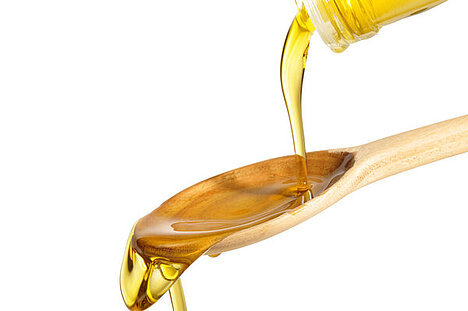Corn oil

What is corn oil?
Corn oil is a yellowish oil that is pressed from the seeds of the corn plant. It has a mild flavor and a high smoke point, which makes it suitable for frying and deep-frying. Corn oil consists of around 60% linoleic acid, an omega-6 fatty acid that is essential for the body. It also contains around 25% oleic acid, an omega-9 fatty acid that can have an anti-inflammatory effect. Other ingredients include palmitic acid, stearic acid, vitamin E and lecithin.
What are the benefits of corn oil for dogs?
Corn oil can have several benefits for dogs if it is fed in moderation. Firstly, it can promote skin and coat health as it moisturizes the skin and makes the coat shiny. Secondly, it can aid digestion as it can have a positive effect on the intestinal flora. It can also strengthen the immune system as it has an antioxidant effect and fights free radicals. Finally, it can also improve heart health as it can lower cholesterol levels and dilate blood vessels.
What are the disadvantages of corn oil for dogs?
However, corn oil also has some disadvantages for dogs that you should be aware of. Firstly, it can lead to obesity as it is very high in calories. One tablespoon of corn oil contains about 120 calories, which is about 10% of a medium-sized dog's daily requirement. Secondly, it can contribute to inflammation as it worsens the ratio of omega-6 to omega-3 fatty acids in the body. Omega-6 fatty acids are important, but in excess they can promote inflammatory processes. Omega-3 fatty acids, on the other hand, have an anti-inflammatory effect and should be in a balanced ratio to omega-6 fatty acids. This ratio is ideally 5:1 or lower in dogs. However, corn oil has a ratio of around 50:1, which is clearly too high.
How much corn oil should dogs be given?
The amount of corn oil you should give dogs depends on various factors, such as the dog's weight, age, health and diet. In general, however, you should not give more than one teaspoon per 10 kilograms of body weight per day. This corresponds to about 40 calories per teaspoon. You should also make sure that the corn oil is cold-pressed and unrefined, as this preserves the valuable ingredients. You should also always combine corn oil with other oils that are rich in omega-3 fatty acids, such as linseed oil or fish oil. This can improve the ratio of omega-6 to omega-3 fatty acids and prevent inflammation.
Corn oil is a vegetable oil that can have some benefits for dogs, but it also has some drawbacks. It can promote skin and coat health, aid digestion, strengthen the immune system and improve heart health, but can also lead to obesity and inflammation. Therefore, corn oil should only be fed in moderation and in combination with other oils rich in omega-3 fatty acids. This is the best way to support your dog's health and well-being.
If you notice any signs of hypersensitivity or poisoning in your dog, you should see your vet immediately. We are not a substitute for a vet, but we try to be as accurate as possible. Every dog reacts differently and we recommend you get a second opinion or consult your vet if in doubt.
Stay healthy and take good care of your four-legged friend!😊
Similar to Corn oil
Sunflower oil can have some health benefits for your dog if you feed it in moderation. For example, it can: Nourish and shine your dog's skin and coat.Support your dog's digestion and prevent...
Rapeseed oil has many positive effects on your dog's health. Here are some of them: Rapeseed oil supports your dog's skin and coat health. It ensures a shiny and supple coat and can help with dry,...
Soybean oil is rich in unsaturated fatty acids, especially linoleic acid and alpha-linolenic acid. These are essential for the dog's body and must be taken in through food. They support skin and...
Olive oil is a vegetable oil that is pressed from the ripe fruit of the olive tree. There are different grades of olive oil, depending on the production process and acidity. The highest quality is...



